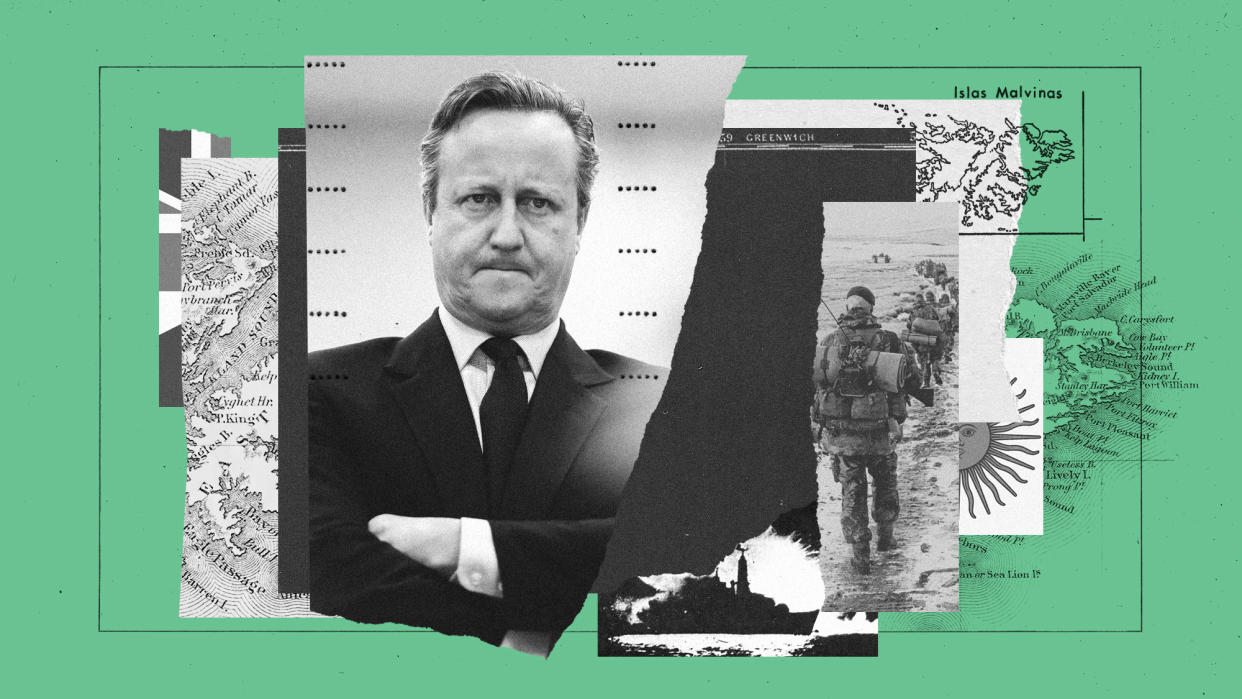Can Cameron put the Falklands sovereignty dispute to bed?

- Oops!Something went wrong.Please try again later.
- Oops!Something went wrong.Please try again later.
David Cameron said that British sovereignty over the Falkland Islands would "not be up for discussion" ahead of his visit to the South Atlantic today.
The foreign secretary is the first cabinet minister to travel to the Falklands since 2016, fulfilling a commitment made last year by his predecessor James Cleverly in response to Argentina "flexing" its muscles over the disputed islands.
Argentina has long laid claim to the self-governing British overseas territory, which has been under British sovereignty since 1833. In 1982, the military junta that ruled Argentina invaded the islands, known in Spanish as "Islas Malvinas", sparking a 10-week war that claimed the lives of 255 British servicemen, three islanders and 649 Argentinian personnel.
What did the commentators say?
Speaking before his trip, which kicks off a multi-country tour of South and North America, Cameron said the Falkland Islands remained "a valued part of the British family, and we are clear that as long as they want to remain part of the family, the issue of sovereignty will not be up for discussion".
His visit comes amid a "renewed push from Argentina over the sovereignty of the contested territory", said Politico. Argentina's new president, Javier Milei, has insisted that his country has "non-negotiable" sovereignty over the islands. "The Malvinas are Argentinian," Milei said during a election TV debate.
The "radical libertarian", who claimed power in December, has "suggested the UK should approach the issue in a similar way to the handover of Hong Kong to China in 1997", said Sky News. "That agreement, however, followed the end of a 99-year lease."
Despite the persistent calls from Argentina, in a 2013 referendum, 99.8% of voters on the Falkland Islands opted to remain a UK overseas territory, with just three people voting against.
Argentina's claim is based on having inherited the islands from the Spanish crown in the early 1800s, and also their proximity to the South American mainland – the archipelago lies 300 miles from Argentina and 8,000 miles from the UK. Britain "rests its case" on its "long-term administration of the Falklands", said BBC News, and on "the principle of self-determination for the islanders, who are almost all of British descent".
Last March, Argentina pulled out of a 2016 agreement that sought to improve cooperation in the South Atlantic between the two countries. Buenos Aires then scored "a major diplomatic win" last summer when the term "Islas Malvinas" was used for the first time in an official capacity by the European Union in a communiqué with Latin American nations, said Politico.
Behind the scenes, London had fought a "rearguard action", said the news site, "applying pressure at the very highest level to discourage Brussels from including the wording".
What next?
Milei has previously downplayed the prospect of military action over the Falklands, stressing that war "is not a solution" and that "we have to make every effort to recover the islands through diplomatic channels". However, his government has announced plans to buy fighter jets, submarines and warships as part of a tripling of its defence budget by 2032, in order to make the armed forces "fundamental institutions of the country".
At the same time, there is "heightened concern" in the UK over the Falklands' security, said The Telegraph, after revealing that the Royal Navy has abandoned major warship patrols because of ship shortages.
Admiral Lord Alan West, who was awarded a Distinguished Service Cross for his part in the Falklands War, told the paper earlier this month that an invasion of the islands was still "highly unlikely at the moment". But he called on the Ministry of Defence to ensure it has "sufficient defence assets in the Falklands to show that if anyone did anything stupid, that they would have some assets that they would have to overcome".

